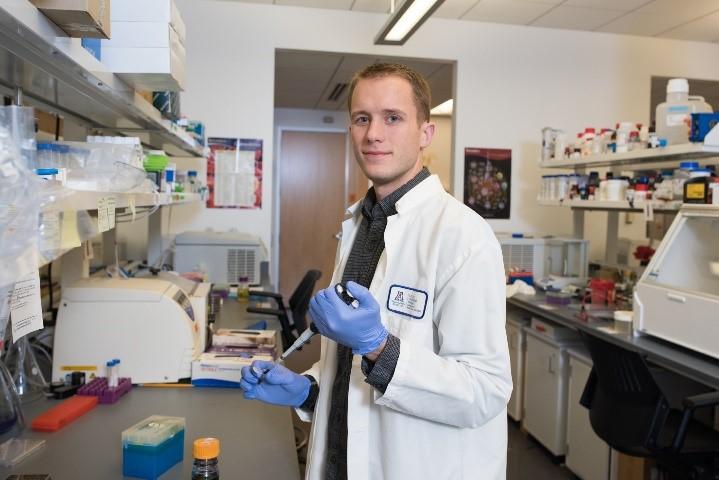
Credit: Photo by Tabbitha Mosier
PHOENIX – Researchers at the University of Arizona College of Medicine – Phoenix have discovered a function in a pro-inflammatory protein that could play an important part in improving current and future therapeutics for the herpes virus.
The study, published in October in the Journal of Immunology, investigated whether the protein IL-36? is an essential component of the immune response to a herpes infection, or if other mechanisms can compensate for the lack of IL-36?.
Cytokines, proteins essential to the immune system, coordinate the response to pathogens and allow for cell-to-cell communication. IL-36? is a pro-inflammatory cytokine identified 20 years ago. Over the years, researchers have shown that it exhibits an important function in chronic inflammatory diseases, but only recently have scientists studied its role in infectious diseases such as herpes.
“We were the first group to detect IL-36? in the female reproductive tract and have been extending this work to evaluate the extent that this molecule can protect against, or contribute to, genital infection,” said Melissa Herbst-Kralovetz, PhD, senior and corresponding author of the study and associate professor in the Department of Basic Medical Sciences at the College of Medicine – Phoenix.
The study was led by Jameson Gardner, a graduate research student in the laboratory of Dr. Herbst-Kralovetz.
“Researchers have worked for decades to develop a vaccine to protect against genital herpes, but none has successfully passed through clinical trials,” Gardner said.
“These efforts have taught us so much about the immune response in the female reproductive tract, but the lack of success potentially indicates that we need to better understand important underlying immune mechanisms in the female reproductive tract as we seek to improve women’s health.”
Despite the widespread use of antiviral medications to treat genital herpes, more than 260 million women worldwide are living with this lifelong infection and transmitting it to new individuals daily.
After the initial genital herpes simplex virus 2 (HSV-2) infection in the vaginal epithelium, the virus spreads through the nervous system, where it establishes latency. The virus goes into “hiding,” where it persists for a lifetime and periodically reactivates, causing lesions.
“We really were excited to see that after intravaginal HSV-2 infection, the virus was able to spread systemically throughout the nervous system and to the brain in those lacking IL-36?, whereas our control group, which had the gene intact, was significantly more protected against HSV-2 spread in the nervous system,” Gardner said. “We’ve shown that IL-36? appears to function in a previously uncharacterized manner to protect against virus neuroinvasion (an infection that affects the nervous system).”
“We stumbled across this neuroinvasion finding and we were able to confirm that IL-36? is limiting the spread of virus from the genital tract to the nervous system,” Dr. Herbst-Kralovetz said.
The precise mechanism in which IL-36? protects against neuroinvasion is unknown, but is an exciting and important area of future research.
In addition, researchers concluded IL-36? played a critical role in recruiting neutrophils, a type of white blood cell that protects against invading pathogens.
“Our understanding of how IL-36? functions can aid in the development of novel therapeutics to protect against – and hopefully decrease – the burden of STIs around the world,” Gardner said.
“The global disease burden of sexually transmitted infections is huge, and this work helps us to better understand the role IL-36? plays in the female reproductive tract and how that could impact women’s health in general.”
###
Please Note: Research funding was supported by a National Institutes of Health grant: 1R15AI113457-01A1 (Herbst-Kralovetz). Other funding includes support by the Valley Research Partnership Grant P12 (Herbst-Kralovetz and Gardner).
DOI: https:/
About the UA College of Medicine – Phoenix
Founded in 2007, the University of Arizona College of Medicine – Phoenix inspires and trains exemplary physicians, scientists and leaders to optimize health and health care in Arizona and beyond. By cultivating collaborative research locally and globally, the college accelerates discovery in a number of critical areas — including cancer, stroke, traumatic brain injury and cardiovascular disease. Championed as a student-centric campus, the college has graduated 500 physicians, all of whom received exceptional training from nine clinical partners and 1,800 diverse faculty members. As the anchor to the Phoenix Biomedical Campus, which is projected to have an economic impact of $3.1 billion by 2025, the college prides itself on engaging with the community, fostering education, inclusion, access and advocacy. For more information, please visit phoenixmed.arizona.edu.
About the University of Arizona Health Sciences
The University of Arizona Health Sciences is the statewide leader in biomedical research and health professions training. The UA Health Sciences includes the UA Colleges of Medicine (Tucson and Phoenix), Nursing, Pharmacy, and the Mel and Enid Zuckerman College of Public Health, with main campus locations in Tucson and the growing Phoenix Biomedical Campus in downtown Phoenix. From these vantage points, the UA Health Sciences reaches across the state of Arizona and the greater Southwest to provide cutting-edge health education, research, patient care and community outreach services. A major economic engine, the UA Health Sciences employs nearly 5,000 people, has approximately 900 faculty members and garners $200 million in research grants and contracts annually. For more information: uahs.arizona.edu
Media Contact
Teresa Joseph
[email protected]
602-827-2657
Original Source
https:/
Related Journal Article
http://dx.




